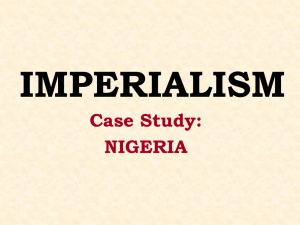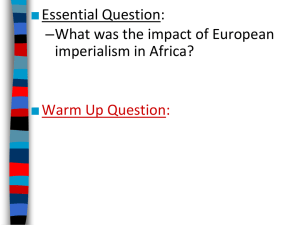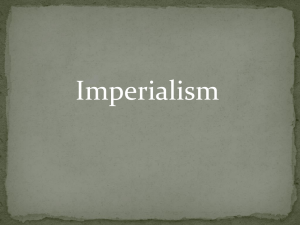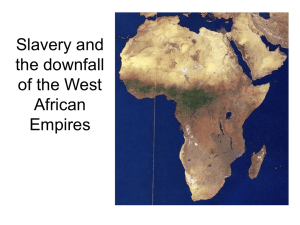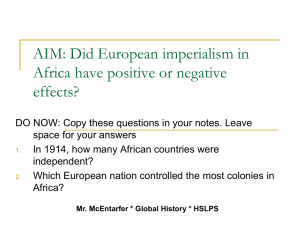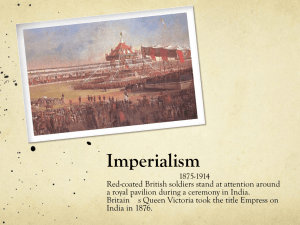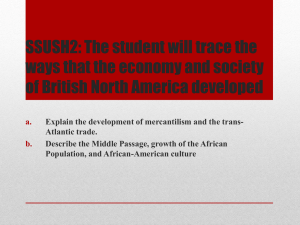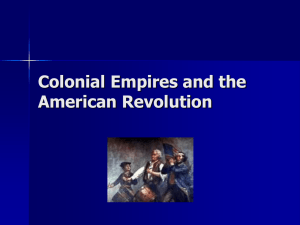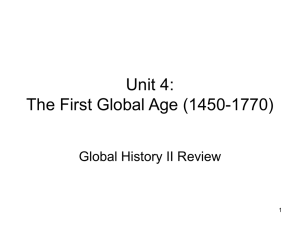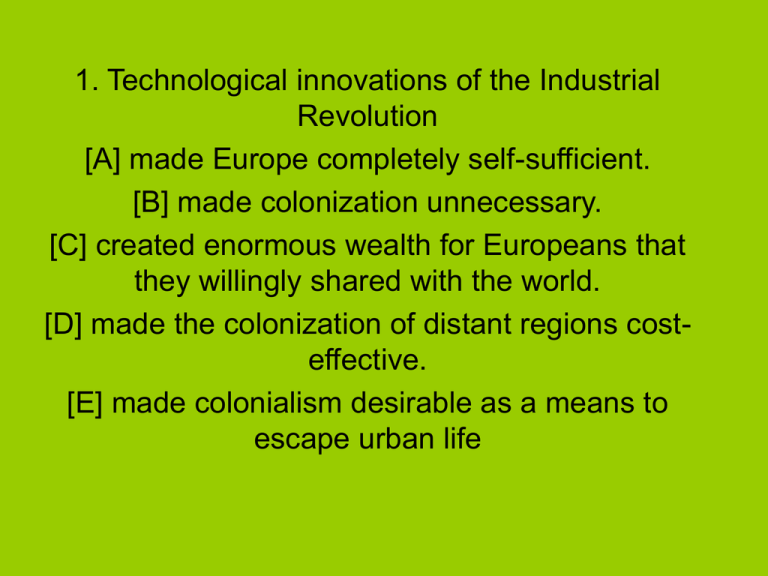
1. Technological innovations of the Industrial
Revolution
[A] made Europe completely self-sufficient.
[B] made colonization unnecessary.
[C] created enormous wealth for Europeans that
they willingly shared with the world.
[D] made the colonization of distant regions costeffective.
[E] made colonialism desirable as a means to
escape urban life
2. Europeans controlled equatorial Africa by
[A] controlling native trade at key port cities.
[B] granting Africans the right and privileges of
citizenship in the European country.
[C] selling monopolies on resources and trade to
private companies.
[D] offering incentives to local rulers.
[E] direct governmental rule.
3. Russians occupied the territory of
Kazakhstan because
[A] of its copper and tin mines.
[B] of a holy war declared by Tsar
Alexander III.
[C] the agricultural land was being
“wasted”.
[D] of constant invasions by Kazakhs.
[E] it was a “hot bed” of terrorist activity.
4. The last independent state in Southeast
Asia in the late nineteenth century was
[A] Indochina.
[B] Malaya.
[C] Siam.
[D] Vietnam.
[E] Burma.
5. Europeans transformed the environment
of Southeast Asian dependencies by
[A] forbidding the growing of food and
demanding the growth of cash crops.
[B] increasing agricultural production by
introducing cinchona and rubber.
[C] practicing slash and burn techniques.
[D] deforestation.
[E] All of these
6. British efforts to increase Egyptian
agriculture resulted in
[A] a large reduction in cotton production.
[B] the annexation of large portions of
Ethiopia.
[C] the “Wheat Revolt” of 1874.
[D] the construction of the Aswan Dam.
[E] the attack on Omdurman.
7. The British wanted to expand to
Southern Africa because of
[A] the marauding Zulu armies.
[B] attacks by the Afrikaners.
[C] discoveries of gold and diamonds.
[D] they wanted to beat the Germans there.
[E] the need for the rich northern
farmlands.
8. One of the greatest barriers to the
European invasion of inland African
territories was
[A] the great African mountains.
[B] Falciparum malaria.
[C] the lack of knowledge of the geography.
[D] the great African rivers.
[E] All of these
9. A technological advance of the late
nineteenth century was
[A] the machine gun.
[B] quinine
[C] smokeless powder.
[D] the breechloading rifle.
[E] All of these
10. The power of Western technology convinced
many Euro-Americans that
[A] as Nietzsche said God was dead.
[B] the West had a lot to learn from non-Western
societies.
[C] neither culture was superior but could co-exist
peacefully.
[D] Western ideas, customs, and culture were
superior to non-Western lifestyles.
[E] non-Western ideas, customs, and culture
were superior to Western lifestyles.
11. The companies brutally forced Africans to
produce crops or gather resources. The worst
abuses occurred
[A] when Africans were forced to grow tobacco.
[B] when Africans were forced to mine silver.
[C] when Africans were forced to mine asphalt.
[D] when Africans were forced to mine diamonds.
[E] when Africans were forced to gather latex for
the rubber boom.
12. The 1898 battle at Omdurman resulted
in 11,000 Sudanese deaths, with British
deaths totaling
[A] 48.
[B] 480.
[C] 1,480.
[D] 4,480.
[E] 44,800
13. The Monroe Doctrine was an attempt by the
United States to
[A] annex new territory and expand slavery.
[B] extend economic capitalism over Latin
America.
[C] defend the entire Western Hemisphere for
outside invasion.
[D] ensure the continued flow of West Indian
sugar.
[E] annex South America in order to turn it into a
part of the United States.
14. Until the 1870s, Africans ruled 90% of Africa,
however within a decade
[A] they had claimed a large portion of South
Asia.
[B] they had reclaimed the 10% lost in prior
years.
[C] they had pushed out Islamic fundamentalist
groups.
[D] they had ended the oppression of the slave
trade.
[E] Europeans invaded Africa referred to as the
“scramble for Africa”.
15. The French initially planned to open the
interior trade of Senegal by
[A] widening the Senegal River for shipping.
[B] building an intricate road system to the coast.
[C] building a railroad to connect with river traffic.
[D] complete deforestation of Senegal.
[E] building a canal from the Senegal and Niger
Rivers.
16. With the flood of Christian missionaries
into Africa, Islam
[A] stagnated and became less powerful.
[B] spread even farther than before.
[C] spread only in areas resisting
Europeans.
[D] remained strong only north of the
Sahara.
[E] was virtually eradicated from Africa.
17. Southeast Asia had great economic potential
because of
[A] the presence of unlimited supply of
geothermal energy
[B] its fertile soil, constant warmth and heavy
rains.
[C] the large amount of craftsmen and artisans.
[D] natural immunity to disease which the local
fruits provided.
[E] All of these
18. Opened in 1869, the Suez Canal
triggered
[A] a wave of European domination over
Asia and Africa.
[B] massive flooding of the country of
Panama.
[C] a trend of canal building throughout the
world.
[D] New Item
[E] All of these
19. To better exploit the economic potential of
Latin America,
[A] a system of dirigible transport was developed.
[B] Western countries discouraged emancipation.
[C] extensive railroad systems were built.
[D] laborers from India were imported in great
numbers.
[E] Euro-American settlers were encouraged to
emigrate.
20. New Zealand elected its own parliament and
ruled itself in large part because
[A] European settlers there were in the majority.
[B] indigenous peoples were strong enough to
demand it.
[C] of the defeat of the British army.
[D] no other system of government had
succeeded.
[E] of the large distance between Britain and New
Zealand.
21. In order to build the Panama Canal, the
United States
[A] supported a Panamanian rebellion
against Colombia.
[B] obtained a concession from Colombia.
[C] negotiated a lease with the
Panamanian government.
[D] formed an alliance with France.
[E] All of these
22. The French government’s political motive for
participating in the New Imperialism was to
[A] distract its citizens from the government sex
scandals.
[B] eliminate a rival political party.
[C] keep the French treasury from bankruptcy.
[D] subvert British control in India.
[E] reestablish national prestige through territory
overseas.
23. With King Leopold’s money, Henry
Morton Stanley
[A] “opened” and occupied the Congo
Basin.
[B] financed a revolution and made himself
Emperor of the Congo.
[C] found Dr. Livingstone.
[D] “opened” and occupied the Moroccan
Basin.
[E] All of these
24. The most successful African resistance
against Europeans took place in
[A] the Sudan.
[B] Ethiopia.
[C] Chad.
[D] South Africa.
[E] Mali.
25. Among the cultural motives was a
desire to
[A] abolish slavery.
[B] “civilize” people of the colonies by
bringing them Western education,
medicine, and customs.
[C] spread Christianity.
[D] end oppressive treatment of women,
like sati.
[E] All of these
26. Although imperialism was not new to
Europeans, this period was uniquely
characterized by
[A] being a land grab of unprecedented speed.
[B] wars of aggression and political
assassination.
[C] retarded growth and slow development.
[D] use of Chinese technology to inspire
European innovation.
[E] All of these
27. The Ethiopian victory over Italy at Adowa was
due to
[A] the intervention of the Germans.
[B] the Ethiopians’ infecting the Italians with
malaria.
[C] the Ethiopians’ being armed with rifles,
machine guns, and artillery.
[D] the Italians’ bringing the wrong maps with
them.
[E] the Italians’ having the worst army in Europe.
28. What was the result of the SpanishAmerican War?
[A] United States interfered heavily in
Cuba.
[B] United States took Guam.
[C] United States purchased the
Philippines.
[D] United States took Puerto Rico.
[E] All of these
29. The United States annexed Hawaii
[A] to keep pace with European
colonialism.
[B] to control the world’s supply of
breadfruit.
[C] for strategic reasons.
[D] as a valuable supply station for whaling
ships.
[E] for its many large sugar plantations.
30. Colonies that were called protectorates
[A] retained their traditional governments.
[B] were merged directly into European
governments.
[C] were administered directly by a
European governor.
[D] were armed as military support troops
for defense of the home country.
[E] were reorganized and given Europeanstyle governments.
31. Hevea trees that were transplanted
around the world produced
[A] rubber for tires and rainwear.
[B] cocoa for chocolate.
[C] quinine for malaria.
[D] coffee as a stimulant.
[E] oil for soap and lubricants.
32. Historians use the term New Imperialism to
refer to the West’s
[A] attempt to use propaganda as a tool of
empire.
[B] isolationism and parochialism in the late
nineteenth century.
[C] use of industrial technology to impose its will
on the nonindustrial world.
[D] policies of preservation of the natural
environment.
[E] All of these
33. South Africa’s 1913 Natives Land Act
was intended to
[A] forbidding Africans from owning land.
[B] keep Africans on reservations.
[C] keep Afrikaners from starting a new
war.
[D] stop British financiers from becoming
too powerful.
[E] Both a & b
34. Since the colonies were governed with small
numbers of European officials, they relied upon
[A] the cooperation of indigenous elites.
[B] the appeal to the pity and understanding of
the average indigenous person.
[C] heavily fortified fire bases.
[D] the availability of European medical care.
[E] brute force and terror tactics..
35. Opened in 1869, the Suez Canal
triggered
[A] a wave of European domination over
Asia and Africa.
[B] a trend of canal building throughout the
world.
[C] the independent growth of Egypt.
[D] massive flooding of the country of
Panama.
[E] All of these
36. Why did Europeans avoid taking formal
colonies in Latin America?
[A] Latin American governments were
cooperative with the Europeans.
[B] The Monroe Doctrine
[C] They were overextended in Africa and
Asia.
[D] Latin Americans proved they could
successfully resist invasion.
[E] All of these
37. The Platt Amendment
[A] gave the United States the right to
intervene to maintain “order” in the
Caribbean.
[B] prevented slavery in the West Indies.
[C] stated that the United States could
occupy any Caribbean island.
[D] allowed U.S. investment in former
Spanish colonies.
[E] All of these
38. Free-trade imperialism in Latin America
meant
[A] economic dependence instead of direct
colonization.
[B] that there were no tariffs for goods traded to
the United States.
[C] a military build up in Latin American countries.
[D] that European powers were free to be
involved there.
[E] All of these
39. The presence of European colonial officials
meant
[A] that Africans wouldn’t have to worry about
food supplies.
[B] that the indigenous people were usually given
full control over state affairs.
[C] that land rights, commercial transactions and
legal disputes were handled differently.
[D] that hostages were usually taken.
[E] All of these
40. The leader of the Filipino movement for
independence was
[A] Ferdinand Marcos.
[B] Ho Chi Minh.
[C] Madam Chang.
[D] Emilio Aguinaldo.
[E] General Giap.
41. Besides conquering large amounts of
territory, the New Imperialism was most
significant for
[A] recognizing international cultural diversity.
[B] allowing dependent areas to develop
governments.
[C] the educational and health benefits bestowed
on the indigenous populations.
[D] spawning racism within Western society.
[E] creating a global economy of suppliers and
consumers.
42. The economic motive for imperialism
was/were
[A] European businesses were motivated to look
for new opportunities in Asia and Africa.
[B] European merchants needed to secure new
markets for their goods.
[C] high demand for raw materials for
industrialization.
[D] they needed to protect their home markets.
[E] All of these
43. The better the European weapons
became, the more the ________________
widened.
[A] “gun breech”
[B] “colonial gap”
[C] “race gap”
[D] “firepower gap”
[E] “Maxim gap”
44. The most harmful aspect of the Western
sense of cultural superiority was/were
[A] that it created a society of poverty and
desperation in Asia.
[B] the use of biological warfare against the
colonies.
[C] the tendency to marginalize non-Western
ideas.
[D] the racist ideas that deemed non-Europeans
inferior.
[E] All of these
45. Often colonial territory was seized without the
consent of the home government by
[A] colonial officers deciding on their claim to a
piece of territory.
[B] mercenaries and escaped convicts.
[C] journalists trying to gather news information in
the tropics.
[D] ex–slave traders motivated to make money
on the colony.
[E] scientists doing research in remote regions of
Africa and Asia.
46. When Western women arrived in the
colonies it created
[A] a more racist and segregated
environment.
[B] a more “civilized” atmosphere as these
women insisted on Western daily customs.
[C] a more relaxed and “homey”
atmosphere.
[D] a more open society.
[E] All of these
47. The colonies offered European women
job opportunities such as
[A] wives for indigenous men.
[B] missionaries, teachers and nurses.
[C] miners and industrial workers in the
colonies.
[D] lawyers and doctors.
[E] colonial officers and administrators.
48. The major decision of the Berlin Conference
of 1884–1885 was that Europeans could
[A] colonize Africa only through individual
treaties.
[B] only colonize Africa by “effective occupation.”
[C] not colonize the eastern region of Africa.
[D] not colonize Africa by military means alone.
[E] travel freely through any colony.
49. Egyptian modernization brought an
accumulation of foreign debt, which caused
[A] the Egypt to borrow money from
Europeans at high interest rates.
[B] the Ottoman Empire to depose Ismail.
[C] the government to sell its shares in the
Suez Canal to the British.
[D] None of these
[E] All of these
50. The British invasion of southern Africa
was driven by the ambitions of
[A] Cecil Rhodes.
[B] David Livingstone.
[C] Nathaniel Hawthorne.
[D] Sir F.D. Lugard.
[E] Thomas Macauley.
51. The United States purchased the
Philippines after the Spanish-American
War in large part to
[A] humiliate the Spanish government.
[B] ensure payment of Spanish war
reparations.
[C] free the Filipino people.
[D] acquire its many important naval bases.
[E] keep out other ambitious colonialist
powers.
52. The system of administering and
exploiting the colonies for the benefit of the
home country is
[A] considered “reluctant imperialism.”
[B] considered “mercantilism”.
[C] the system of “benevolent neglect.”
[D] considered “splendid isolation.”
[E] considered “colonialism.”

